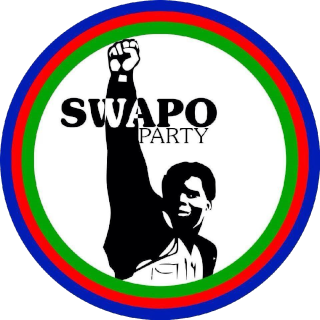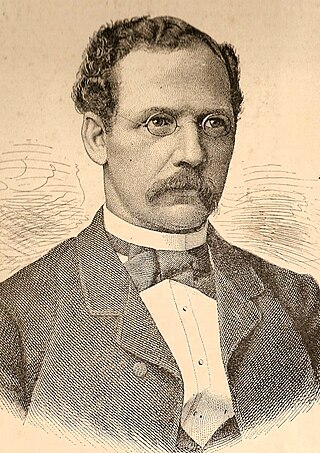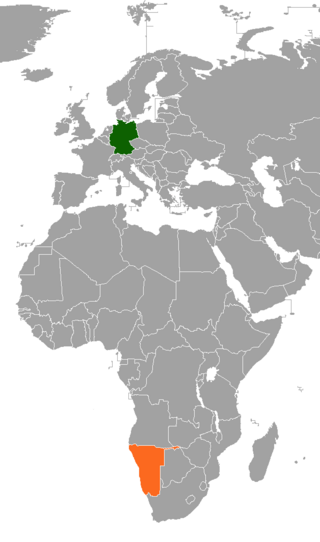Related Research Articles

Namibia, officially the Republic of Namibia, is a country in Southern Africa. Its western border is the Atlantic Ocean. It shares land borders with Angola and Zambia to the north, Botswana to the east and South Africa to the east and south. Although it does not border Zimbabwe, less than 200 metres of the Botswanan right bank of the Zambezi River separates the two countries. Its capital and largest city is Windhoek.

Walvis Bay is a city in Namibia and the name of the bay on which it lies. It is the second largest city in Namibia and the largest coastal city in the country. The city covers an area of 29 square kilometres (11 sq mi) of land. The bay is a safe haven for sea vessels because of its natural deep-water harbour, protected by the Pelican Point sand spit, being the only natural harbour of any size along the country's coast. Being rich in plankton and marine life, these waters also draw large numbers of southern right whales, attracting whalers and fishing vessels.
The history of Namibia has passed through several distinct stages from being colonised in the late nineteenth century to Namibia's independence on 21 March 1990.

The South West Africa People's Organisation, officially known as the SWAPO Party of Namibia, is a political party and former independence movement in Namibia. Founded in 1960, it has been the governing party in Namibia since the country achieved independence in 1990. The party continues to be dominated in number and influence by the Ovambo ethnic group.

Samuel Shafiishuna Daniel Nujoma, is a Namibian revolutionary, anti-apartheid activist and politician who served three terms as the first President of Namibia, from 1990 to 2005. Nujoma was a founding member and the first president of the South West Africa People's Organization (SWAPO) in 1960. Before 1960, SWAPO was known as the Ovambo People's Organisation (OPO). He played an important role as leader of the national liberation movement in campaigning for Namibia's political independence from South African rule. He established the People's Liberation Army of Namibia (PLAN) in 1962 and launched a guerrilla war against the apartheid government of South Africa in August 1966 at Omugulugwombashe, beginning after the United Nations withdrew the mandate for South Africa to govern the territory. Nujoma led SWAPO during the lengthy Namibian War of Independence, which lasted from 1966 to 1989.

Omaruru is a town in the Erongo Region of central Namibia. The town has 14,000 inhabitants and encompasses 352 square kilometres (136 sq mi) of land. It is situated near Mount Erongo, on the usually dry Omaruru River. It is located on the main paved road from Swakopmund to Otjiwarongo. The name in the Otjiherero language means 'bitter milk', as Herero cattle herds used to graze on the local bush that turned their milk bitter.

Franz Adolf Eduard Lüderitz was a German merchant and the founder of German South West Africa, Imperial Germany's first colony. The coastal town of Lüderitz, located in the ǁKaras Region of southern Namibia, is named after him.
The Ovamboland People's Organization (OPO) was a nationalist organization that existed between 1959 and 1960 in South West Africa. The aim of the organization was to end the South African colonial administration, and the placement of South West Africa under the United Nations Trusteeship system. Andimba Toivo ya Toivo had founded its predecessor, the Ovamboland People's Congress, in 1957 in Cape Town, South Africa. In 1959, Sam Nujoma and Jacob Kuhangua established the Ovamboland People's Organization (OPO) at the Old Location in Windhoek. Sam Nujoma was the president of OPO until its transformation into the South West Africa People's Organization (SWAPO) a year later and remained president until Namibia gained independence in 1990.

Germany–Namibia relations are the bilateral relationship of Germany and Namibia. This relationship is of particular importance as Namibia was colonized and occupied by the German Empire in the 19th century. There is also a community of approximately 30,000 German Namibians residing in Namibia today. Both nations are members of the United Nations. Culturally, both countries are part of the Germanosphere.
Andreas Zack Shipanga was a Namibian politician known for the "Shipanga Rebellion", a movement within SWAPO that sought to elect a new leadership and whose followers were in response detained without trial. Imprisoned for two years following this fall-out, Shipanga was arrested and held in detention in Zambia then Tanzania until 1978. After his release from prison he founded the opposing SWAPO Democrats and served as minister in different portfolios in the Transitional Government of National Unity, the interim government of South-West Africa directly before Namibian independence.
Emil Appolus was a Namibian politician and businessperson.
Nora Schimming-Chase was a Namibian politician and Namibia's first ambassador to Germany from 1992 to 1996. After changing her party membership from South West Africa National Union (SWANU) to Congress of Democrats (CoD), Schimming-Chase became a member of the National Assembly of Namibia from 2000 to 2010.

Peter Mweshihange was a Namibian revolutionary and guerrilla leader, and after Namibian independence, a politician and diplomat. He was the Namibia's first Minister of Defence from 1990 to 1995, and first ambassador to the People's Republic of China from 1996 until his death.
Ottilie Grete Abrahams was a Namibian educator, activist, and politician.
Tobias Hainyeko (1932–1967) was a Namibian guerrilla fighter who served as the first commander of the People's Liberation Army of Namibia (PLAN) during the Namibian War of Independence from the 1960s through to the 1980s.

Ramin Muzaffar oglu Hasanov is an Azerbaijani diplomat, the Ambassador Extraordinary and Plenipotentiary of the Republic of Azerbaijan to the Republic of Korea. Before he was the Ambassador Extraordinary and Plenipotentiary of the Republic of Azerbaijan to the Federal Republic of Germany.

Henning Melber is a German political scientist and sociologist. He is a German-Namibian and Swedish Africanist and political activist.
Hanno Burkhard Rumpf was a Namibian politician (SWAPO) and diplomat.

Ndeutala Angolo, also known as NdeutalaSelma Hishongwa and Ndeutala Angolo Amutenya, is a Namibian writer and political activist.
References
- ↑ El-Menshawy, Nahla (29 August 2016). "Amb. Andreas Benjamen Dawid Guibeb, Former Ambassador of Namibia in Berlin, talks to Berlin Global". Berlin Global.
- ↑ "Guibeb: What I really told the Germans". New Era. 24 March 2016.
- ↑ "About us". Marcellus Capital.
- ↑ "H.E. ANDREAS BENJAMEN DAWID GUIBEB". Diplomatisches Magazin.
- ↑ "Air Namibia, loved but heartbreaking". The Namibian. 11 September 2015.
- ↑ "H.E. ANDREAS BENJAMEN DAWID GUIBEB". Diplomatisches Magazin.
- ↑ "NAMIBIA CALLS FOR RETURN OF CULTURAL RELICS FROM FORMER COLONIAL POWER GERMANY". Namibia News Digest. June 20, 2018.
- ↑ Shelton, John (May 17, 2019). "Germany returning Stone Cross to Namibia". Deutsche Welle.
- ↑ "L'Allemagne va restituer à la Namibie un monumental calvaire du XVe siècle". No. 28 May 2022. Le Figaro. AFP.
- ↑ "Cape-Cross-Säule: "Markantes Zeichen" oder "Ablenkung"?". Allgemeine Zeitung. 17 May 2019. Archived from the original on 25 April 2023. Retrieved 25 April 2023.
- ↑ Idowu, Ronke Sanya (May 17, 2019). "Germany To Return 15th-Century Stone Cross To Namibia". Channels Incorporated.
- ↑ "Germany to return Portuguese Stone Cross to Namibia". BBC. 17 May 2019.
- ↑ Beukes, Jemima. "GUIBEB IN DEBT SCANDAL". No. 17 May 2019. Namibian Sun.
- ↑ "Diplomat pfeift auf unsere Gesetze und kommt damit durch". BZ. 21 May 2019.